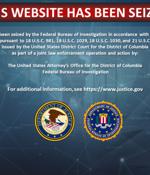Security News

We have seen a surge in WhatsApp accounts being hacked, if you are sent a text from WhatsApp with a code on it, don't share the code with ANYONE no matter who's asking, or the reason why. We've discussed this scam before on the Naked Security podcast, because it's a good reminder of how cybercriminals use one hijacked social media account to target others.

The city of Tulsa, OK is asking some of its residents to keep a close eye on their personal and financial accounts after the Conti ransomware group leaked some 18,000 city files, mostly police citations, on the dark web. The websites for the city, the Tulsa City Council, the city's police force and Tulsa 311 also were affected in the attack.

The City of Tulsa, Oklahoma, is warning residents that their personal data may have been exposed after a ransomware gang published police citations online. The attack disrupted Tulsa's online bill payment systems, utility billing, and email, as well as the websites for the City of Tulsa, the Tulsa City Council, Tulsa Police, and the Tulsa 311.

Ukrainian police have carried out nearly two dozen raids targeting alleged associates of a Russian-speaking ransomware gang it blamed for a half billion dollars in cyberattacks and extortion that hit the United States and South Korea especially hard. A police statement on Wednesday said 21 raids were conducted on the homes of suspects affiliated with the Clop ransomware syndicate in Kyiv and elsewhere, with computer equipment and about 5 million hryna in cash seized.

Ukrainian law enforcement officials on Wednesday announced the arrest of the Clop ransomware gang, adding it disrupted the infrastructure employed in attacks targeting victims worldwide since at least 2019. The ransomware attacks amount to $500 million in monetary damages, the National Police said, noting that "Law enforcement has managed to shut down the infrastructure from which the virus spreads and block channels for legalizing criminally acquired cryptocurrencies."

Authorities in Ukraine this week charged six people alleged to be part of the CLOP ransomware group, a cybercriminal gang said to have extorted more than half a billion dollars from victims. According to a statement and videos released today, the Ukrainian Cyber Police charged six defendants with various computer crimes linked to the CLOP gang, and conducted 21 searches throughout the Kyiv region.

Ukrainian police have arrested six people, alleged to be members of the notorious Clop* ransomware gang, seizing cash, cars - and a number of Apple Mac laptops and desktops. The six suspects were arrested in joint raids carried out with South Korean law enforcement authorities earlier today, cops in Ukraine said.

The U.S. Department of Justice announced on Thursday that a multinational operation has led to the seizure of Slilpp, a well-known marketplace for selling stolen online logins that offered more than 80 million sets of credentials for sale. Since 2012, Slilpp has been an underground market to buy and sell logins for bank accounts, online payment accounts, mobile phone accounts, retailer accounts and more, according to the DOJ. Those who purchased the login credentials used them to conduct unauthorized transactions, such as wire transfers.

Federal police broke Canada's privacy laws by using a US company's controversial facial recognition software in hundreds of searches, an independent parliamentary watchdog ruled Thursday. In a report to lawmakers, privacy commissioner Daniel Therrien said Clearview AI's collection of images without consent and the Royal Canadian Mounted Police's use of that database were illegal.

Australia's Federal Police is getting more help from some very good boys with four paws, wagging tails, and the ability to sniff out tech equipment with their highly sensitive noses. The dogs can sniff out things like USB sticks or SIM cards, a task difficult for humans seeing as the devices are small and easily hidden.